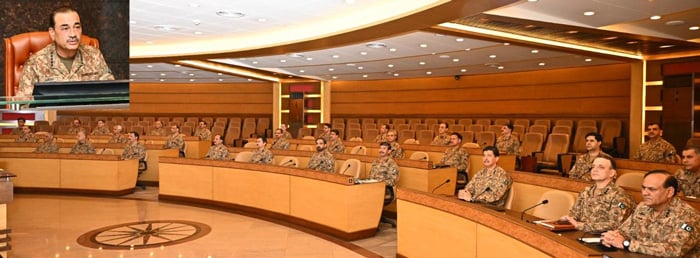The Pakistan Army leadership has once again reaffirmed its firm resolve to crush Indian proxies and their handlers at every level. This message came from the 271st Corps Commanders’ Conference (CCC), held in Rawalpindi and chaired by Field Marshal Syed Asim Munir, the Chief of Army Staff.
According to the Inter-Services Public Relations (ISPR), the conference openly condemned the rising wave of terrorist attacks being carried out by Indian proxies. It declared a decisive response to these threats. Army officials stated that these India-backed groups were acting on orders from New Delhi after India suffered a recent military defeat.
In May, war broke out between Pakistan and India. The conflict started when India launched direct attacks on Islamabad. India claimed that Pakistan was behind the assault on tourists in Pahalgam, located in Indian Illegally Occupied Jammu and Kashmir. The Pakistani government rejected these accusations, calling them baseless.
Although the fighting stopped after 90 hours due to Pakistan’s strong military response, the ISPR revealed that Indian-funded terrorists continued to target Pakistan. These New Delhi-sponsored elements carried out several attacks within Pakistani borders, according to official reports.
During the CCC meeting, army commanders offered Fateha for the martyrs of these recent attacks. They vowed that the sacrifices of the Shuhada would not go in vain. “The safety and security of the people remain the top priority for Pakistan’s armed forces,” the ISPR noted.
The forum highlighted the shift in India’s strategy. After facing defeat on the battlefield, India is now pushing its dangerous plans through Indian proxies like Fitna al-Khawarij and Fitna al-Hindustan. Army leadership also discussed India’s growing propaganda campaign following its failure in direct combat.
Field Marshal Asim Munir criticized the Indian military’s baseless accusations. He said that India was trying to cover its losses and mislead global opinion. He pointed out that India’s efforts to involve third-party powers in a direct military matter were dishonest. “This is a clear attempt at bloc politics,” the COAS stated.
He further said the region is losing faith in India’s aggressive ambitions and extremist Hindutva ideology. The COAS noted that New Delhi’s image as a so-called “security provider” is falling apart.
Field Marshal Munir also shared updates on Pakistan’s recent diplomatic success. He talked about his visits to Iran, Türkiye, Azerbaijan, Saudi Arabia, and the UAE. These trips, alongside Prime Minister Shehbaz Sharif, aimed to strengthen regional partnerships and share Pakistan’s perspective.
He also highlighted his “historic and unique” visit to the United States. Meetings with top U.S. officials provided Pakistan the chance to share its views on important bilateral and global issues. The forum saw this as a major step forward for Pakistan’s diplomacy.
The CCC also discussed internal and external security. The commanders focused on the situation in the Middle East and Iran. They warned of the rising global use of force as a political tool. In response, they emphasized the need for self-reliance, unity, and strength.
The army leadership reviewed Pakistan’s ongoing defense reforms. These include preparing for new threats and adapting to modern warfare. The COAS praised the Pakistan Navy and Pakistan Air Force for enhancing cooperation between the three services.
In his final remarks, Field Marshal Asim Munir expressed complete trust in the army’s readiness. He said that Pakistan’s armed forces are fully capable of defending the country against any challenge—including those posed by Indian proxies and their India-sponsored militants.


